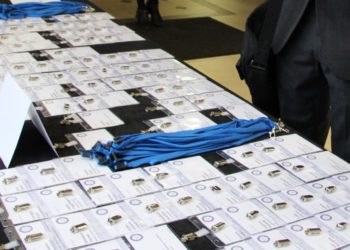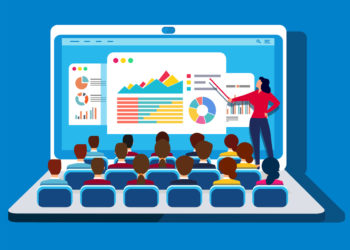Editor’s Note: The annual Researcher to Reader Conference (R2R), which took place in London on 20-21 February 2024, normally concludes with a summary which recaps and re-evaluates what the two-day event covered, to provide context, commentary and closure for the participants. This year Dr Heather Staines ‘volunteered’ to deliver this short session, and what follows is the video recording of that presentation and an abbreviated and lightly edited version of the closing summary, providing a compact overview of the ethos and content of the 2024 Conference. (Note the embedded links to full and publicly available videos of referenced sessions.)
Researcher to Reader is a unique meeting. Now, I must say that I’m biased, as I’ve been on The Advisory Board for a couple of years now. The workshops, which meet in three one hour sessions over the course of the conference, in particular are great for Early Career folks; so, if you are a Director or a Manager, bring along your early career staff next year and let them benefit. And R2R is a great size for networking, with about 150 to 200 participants.
I’ve been crowdsourcing feedback from many of you over the past few days. Some of the hot topics of conversation in the breaks: sleep (amount of or amount lacking), “kids these days”, careers not to go into, particularly for the kids, countries we could move to if we had the choice. In all seriousness, both first time attendees and longtime attendees gave me great feedback: great food, great venue, great program, and how much better it is to get together in real life than in Zoom– maybe we even dress better than we do on Zoom– at least we probably put on pants.
Some of the common threads that ran through the program, which I’ll come back to again at the end, came up in the Open Access ebook Data Trust Workshop I attended: predictability versus variability – I think that’s a running theme and also that equity should be something we strive for constantly.
I’m going to spend a bit more time talking about the sessions yesterday than those today. If you can’t remember what you heard today, you’re not going to remember what I’m telling you now, so I think we’ll be good.
We kicked off with a wonderful keynote by Antonia Seymour from IOP Publishing, and I appreciate that she has stuck it out here until the end. We must transition and perform – I think we would all agree that both are necessary. I also enjoyed her perspective on leadership as a mindset. Antonia laid out a lot of foundational themes that we would revisit in the presentations and workshops throughout the meeting.
Next, we heard two presentations on local OA initiatives in Achieving and Sustaining Open Access Through Local Initiatives. From CERN’s Kamran Naim we heard an update on the SCOAP3 initiative, a model where libraries put money together centrally to pay publishers, which is interesting to compare with some of the presentations and viewpoints in Jayne Marks’ session earlier today about building a university-based infrastructure. I wasn’t aware of the community values disclosure of SCOAP3. I also appreciated the critical consideration of the project and why it may not be easily replicable by other disciplines (outside High Energy Physics). We also heard Ana Heredia’s overview of regional Latin American “non-mainstream” journals which both fill knowledge gaps and bridge knowledge gaps. Many of us probably thought that OA was pretty homogeneous across Latin America and Central America. I was surprised to learn about the differences in OA in Brazil. I certainly want to dig more into that.
Next, we participated in Rick Anderson’s ever popular Oxford-style debate between Keith Webster and Mandy Hill, “Academic Libraries Are No Longer Necessary.” It’s really thought-provoking to consider the issue from both sides: what is a library, what is a librarian? I was a bit mindful of “How the Grinch Stole Christmas”, when the Grinch took away all the traditional Christmas decorations and presents and food, and Christmas came anyway. Take all of the traditional attributes of a library, and it’s still at heart a library. I appreciated the robust discussion of the essence of a library. As Rick noted, we had the two most perfectly-timed debate responses – which never happens – and the final results ending in a draw – for the first draw ever.
Finally yesterday, Jo Wixon’s session Translating Research into Action communicating with professionals, policymakers and the public on sustainability with Roger Worthington and Jay Patel, made us think about the benefits of broader communication. We often talk about the general public, wondering if they’d be interested in reading specific research, but practitioners and other segments of society might well be left out of this conversation. It certainly takes particular skills to try to translate research into small digestible bites like Plain Language Summaries.
And on to day two – remember all the way back to this morning? Making New Models For Scholarly Communication a Reality, Chaired by Jayne Marks. It was great to hear how both Yvonne Nobis and Björn Brembs wear multiple hats, that they look at the issue from different perspectives. Both Yvonne and Roheena Anand were optimistic about the future. What else can we be, if not optimistic? I thought a lot about Björn’s historic example of the (then mostly male) professors once dictating their papers (to mostly female typists) and how few would have predicted how the publication process would change. We all need to open our minds.
Next up, Kaveh Bazargan talked to us about Dealing with Research Misconduct in Scholarly Publishing, both the new technologies and the sleuthy scientists who are working pro bono in their spare time to uncover it. I was intrigued to hear some specifics about this process. When you talk to folks on Research Integrity teams, they often say that they can’t tell you how this process works because then the bad actors will change their ways. (I suspect that the bad actors know well before we do.)
We then heard Roheena Anand’s session, Navigating the Pressures of Modern Research: Cultivating an Equitable and innovative Academic Culture with Mokoto Yuasa, Zhang Hongliang, and Rashna Bhandari who detailed the perspective of researchers in their regions, both areas where research output is increasing and where it is declining. All of us could benefit from experiencing more academic meetings in India and Asia.
We heard US university perspectives on Transformative Agreements. As Michael Levine-Clark mentioned, I work closely with that team (so I must disclose that conflict of interest). The relevant data around these models is continuing to grow in importance. University of Kentucky’s Ben Rawlins detailed the saga of the “transformative agreement that wasn’t” and that actually resulted in the end of the relationship with a publisher.
Just a while ago, our workshop facilitators provided wonderful summaries of the many workshops. I believe I talked to people from every single workshop. Putting those things together – and I’ve done it twice – is a lot of work. We should all appreciate the time and attention that went into them.
Finally, we had We Don’t Know What We Don’t Know: Multi-sector and Multi-disciplinary Experience to break down Barriers, moderated by Lisa Hinchliffe, and featuring Gwen Evans, Keith Webster, and Karin Wulf. We could see from the presenters’ varying experiences that most of us here wear multiple hats, and we may be more alike at the end of the day than we are different. The term “triple helix of government, university, and industry” was a new one for me. I’m also going to think about the “sweet spot of collaboration.” That’s a great way to consider it. As a historian myself, Karen’s remark that “authoritarians understand how valuable and powerful history is” is a bit chilling, but very important to keep in mind.
Looking ahead to next year’s conference, I heard many times that we need to get more researchers here. I also heard that there were many researchers in the Early Career Workshop, so maybe we need to amplify that presence to the main stage.
In conclusion, the common themes: things are always more complicated than you think and harder to scale than you might believe. Keep your curiosity and your goodwill, and see you back again next year.



